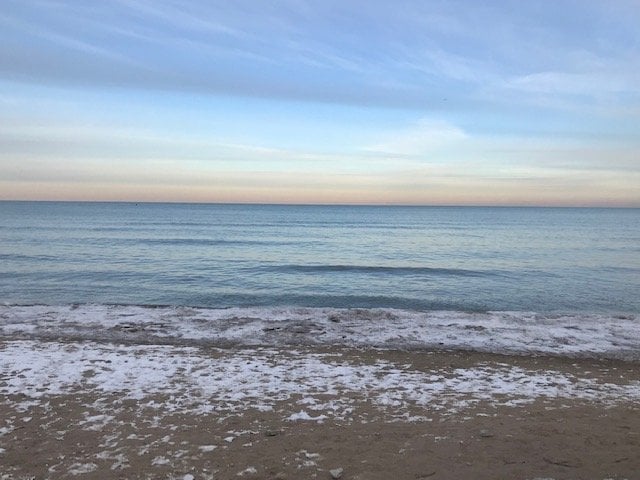City Council moves forward with proposal for non-resident lakefront parking charges
Daily file photo by Maia Spoto
The Evanston lakefront at sunset. On Monday, City Council advanced a proposal for lakefront parking charges for non-residents, which will go to a final vote at the July 12 meeting.
June 29, 2021
City Council voted to introduce a pilot program that would implement lakefront parking charges for non-residents Monday, moving forward with a proposal that would reverse the area’s longstanding free parking status.
The introductory vote initially tied 4-4, with Ald. Peter Braithwaite (2nd) absent. Mayor Daniel Biss cast the tie-breaking vote, deciding to move the proposal forward for final action at City Council’s July 12 meeting.
The proposal was introduced to Council just a month after a resolution passed implementing three free beach days — a program that the city estimated would create around $1 million in lost income. Ald. Tom Suffredin (6th), who suggested the idea of lakefront parking fees in April, said the program could be a way for the city to raise revenue lost from free beach access.
“The money has to come from somewhere,” Suffredin said. “Nobody who you represent would be affected by this at all. So when we come to this for action, I’d like you all to just consider what you’re willing to do in order to get free beaches next year.”
However, some residents and alderpeople expressed doubt toward the amount of revenue the fees would raise and opposed the proposal because of the potential limitations that could result from parking charges. Ald. Clare Kelly (1st) said the program will place more restrictive measures on the lakefront, which is not the “right place to generate revenue.”
Resident David Reynolds said the proposed costs are counterintuitive and the parking meters, if implemented, could negatively impact lakeside views.
“It is ironic to propose charging people to use our lakefront, just as we finally opened our beaches to everyone,” Reynolds said. “If we lift the price on one group only to lower it on another, it’s inconsistent and is not the welcoming community Evanston strives to be.”
Reynolds, along with Alds. Melissa Wynne (3rd) and Jonathan Nieuwsma (4th), also expressed concern that the city has not conducted any research into the potential impacts of the program.
Nieuwsma called for more public engagement in the process. Wynne, who called the ordinance “hasty,” said some non-residents may try to fill spaces in free lots reserved for Evanston residents in an attempt to avoid parking fees.
However, Ald. Cicely Fleming (9th) said the notion of paid parking is already in practice across much of the rest of the city, even for residents. As a result, paid lakefront parking for non-residents should be a valid option for a trial budgetary supplement, she said.
Similarly, Ald. Devon Reid (8th) emphasized the temporary nature of the proposal, and said the trial period will allow the city to figure out the long-term feasibility and impact of the program.
“This isn’t a permanent law — we can undo it,” Reid said. “I’d be hoping that, particularly if you’re supportive of making our beaches truly accessible to folks, you would support moving this forward.”
Email: [email protected], [email protected]
Twitter: @jacobnfulton, @delaneygnelson
Related Stories:
— Evanston to offer three free weekly beach days after advocacy against token sales
— How Evanston’s beach tokens create an access barrier to Lake Michigan
— Evanston’s Fourth of July cancellation receives right-wing criticism












